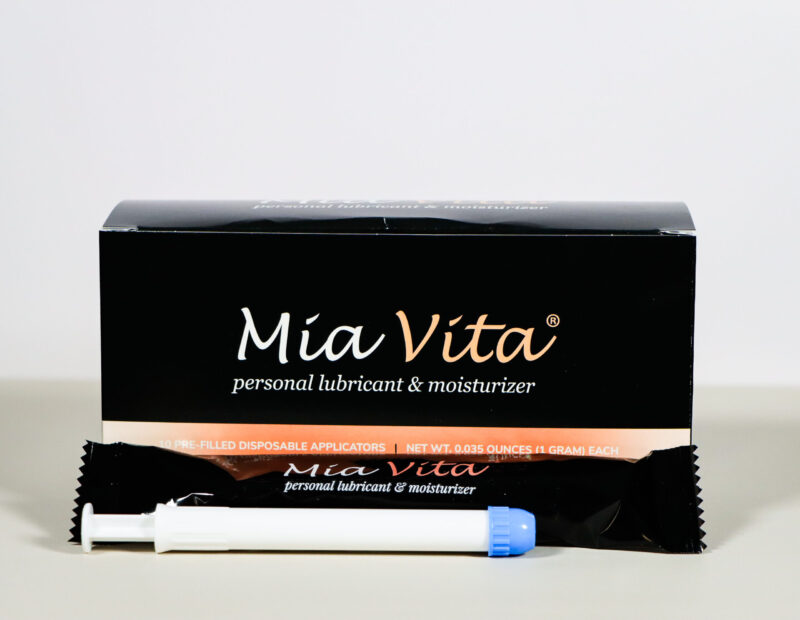Let’s clear up a common myth: sex should not hurt during the menopause transition. That said, many women can begin to feel discomfort during sex or a loss of sensation due to their changing hormones.
Low libido often accompanies menopausal changes, which can also make arousal and satisfying sex more of a challenge. But rest assured that, with the right knowledge, tools, and support, sex can remain comfortable (and pleasurable) throughout menopause.
What causes pain during sex?
Pain during sex, also known as dyspareunia, can have multiple causes outside of the menopause transition.
Some women experience vaginismus, which involves involuntary spasms of the vaginal muscles, often brought on by anxiety or previous negative sexual encounters.
Other causes of dyspareunia include vulvodynia, unidentifiable chronic pain around your vulva, and deep dyspareunia, which only occurs during deep, vaginal penetration and primarily in women with fibroids or conditions like endometriosis.
Causes of Painful Sex During Menopause
Up to 75% of women report vaginal atrophy as a primary, life-altering symptom of menopause, and in women over 50, it’s the most common cause of dyspareunia.
Other common causes of painful sex during menopause include:
- Reduced Lubrication—With less natural lubrication, friction during sex increases, which can cause discomfort. The vaginal canal may also become shorter and tighter due to the loss of estrogen and make penetration more uncomfortable.
- Tissue Sensitivity—Thinner vaginal tissue can be more sensitive and prone to tears and inflammation since it cannot stretch as easily during penetration.
- Stress and Anxiety—Anticipation of pain can cause stress to increase, causing low arousal, a lack of lubrication, and muscle tightness. However, low arousal can cause more pain during sex, which can lead to less interest in sexual activity overall and affect your relationships and self-esteem.

What You Can Do to Make Sex More Comfortable During Menopause
Keep in mind that each woman experiences menopause differently. So, it may take time to find what works best to increase your own pleasure and decrease pain during sex once you enter menopause. Start by trying one (or several) of the following recommended strategies to make sex more comfortable and enjoyable.
Use a Lubricant and Moisturizer Made Without Hormones
Over-the-counter lubricants and vaginal moisturizers can help alleviate dryness and reduce friction. Our Mia Vita Personal Lubricant and Moisturizer increases both comfort during sex and relieves irritation. Key ingredients like sodium hyaluronate and vitamin E also help your vagina retain more moisture and a sufficient water balance over time. For maximum benefit, most women use the moisturizer every day for 20-28 days, then every couple of days to maintain its benefits.
Mia Vita® Personal Lubricant & Moisturizer
Women’s preferred Mia Vita® Personal Lubricant & Vaginal Moisturizer relieves vaginal dryness on contact. Reduces vaginal discomfort and painful sex by restoring your natural lubrication. Enjoy sex again! Formulated with natural ingredients like Hyaluronic Acid and Vitamin E and made without hormones. 10 single-use prefilled applicators per box. Use as a daily vaginal moisturizer and…
In stock
Maintain Your Vaginal Health
Simple practices like wearing cotton underwear and avoiding harsh soaps, douches, and most “feminine hygiene” products can help prevent irritation. Regular appointments with an OB-GYN can also identify and treat any underlying causes of painful sex.
Consider Pelvic Floor Physical Therapy
Pelvic floor physical therapy, a specialized treatment for the pelvic floor, is performed by a certified physical therapy professional. The therapy may include exercises that can help relieve painful sex, bladder, and bowel discomfort.
Stay Active
Regular exercise can help improve blood flow, which can boost sexual function. Work toward a balanced routine that includes cardiovascular, strength, and flexibility training like fast walking and lifting weights.
Prioritizing exercises that help strengthen your pelvic floor muscles can also help improve blood flow to the vaginal area, which can enhance lubrication and reduce pain.
Prioritize Stress Relief

Sexual discomfort can be stress-inducing on its own, and even more so if anxiety or past painful experiences contribute to discomfort. Take a moment and try a mindfulness practice or a deep breathing exercise to reduce muscle tension and increase relaxation before sex. You may also want to talk to a therapist to help manage fear, anxiety, or other mental health concerns.
Communicate with Your Partner
Open communication with your partner is essential. Discuss your discomfort and explore new sexual positions or activities that might be more comfortable for you. Remember, intimacy isn’t limited to penetration; other forms of sexual expression can be equally satisfying!
If pain during sex continues, make an appointment with your healthcare provider to learn about additional treatment options and to understand the root causes of your pain. Remember, menopause is a natural part of life and does not mean the end of a satisfying sex life.

